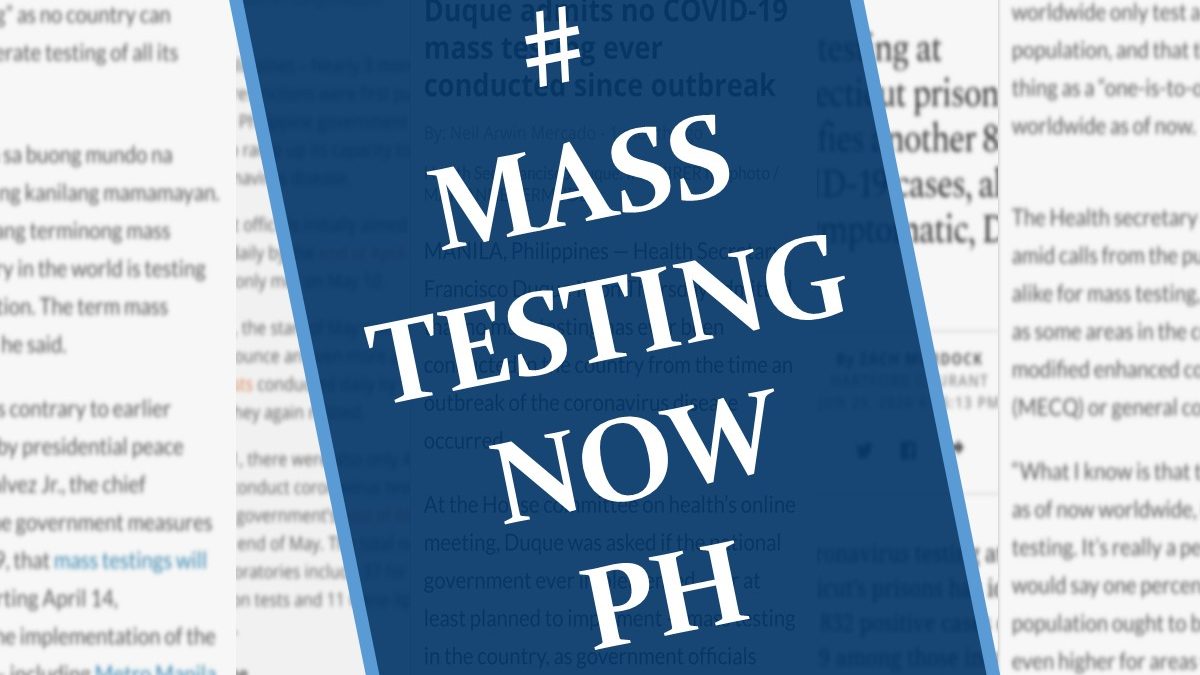
YOU MATTER
July 27, 2020
SBA orgs plan ahead to brace pandemic
July 27, 2020Gov’t leaves carrying out of mass testing to private sectors, Roque says

Presidential Spokesperson Harry Roque said that the government still has no plans of conducting mass testing despite the rapid increase of positive cases in the country and leaving all the authority with such efforts to the hands of private sectors.
“As much as possible, ini-increase natin ang capacity ng testing kaya nga we’re aiming na aabot tayo sa 30,000, pero in terms sa mass testing na ginagawa ng Wuhan na 11 million [residents], wala pa pong ganyang programa at iniiwan natin iyan sa pribadong sector,” Roque stated in a Malacañang press briefing.
Urgent testing and intensive treatment of COVID patients are the top priority of most Filipinos to combat the virus effectively. It also causes a rampant social media call for mass testing. The authorities neglected the idea but later implemented a “progressive COVID-19 testing program” which prioritized individuals with severe flu-like symptoms, people with pre-existing health conditions, the elders, pregnant with mild symptoms, and health care workers with respiratory symptoms.
Netizens acted relentlessly on twitter and made the #MassTestingNowPH a hot trending topic when Roque responded to the wrong statement thrown at him regarding the issue of mass testing due to lack of resources.
“Well actually, that was taken out of context ‘no because the question to me asked by your reporter and by Joseph Morong was in connection with the Department of Health’s (DOH) policy on whether or not employees are required to undergo COVID testing as a prerequisite for going back to work ‘no…” he stated. “I said that the protocols of the DOH does not require COVID testing as a prerequisite to go back to work, but it doesn’t mean that if the employers want to test them, they are prevented from doing so.”
According to him, mass testing is not the proper term to use as to what the government is conducting. Targeted testing is more accurate because the government is aiming to test at least 1.5-2% (or 30,000 people a day) of the population at the end of May, particularly in the areas where the virus is raging, but failed to do so.
“No country in the world will test every single citizen; that’s a fact. So what we are doing is we’re trying to follow the best examples that we have and right now we’re trying to follow the footsteps of South Korea, and that is why the goal is to test 1.5 to 2 percent of the total population- I think it’s physically impossible to test 110 million but we’re aiming to test, also using statistics as science ‘no”, he said.
The government is aiming again to reach 30,000 people who will be tested per day by the end of June this year.
Roque also claimed that we have one of the most stringent testing protocols where all OFWs are subject to PCR testing and remain quarantined until the result has not yet arrived in which other countries are not applying.
As far as the University is concerned, Mr. Robert P. Tantingco, VP for Student Services and Affairs, was asked what will be the plan of action of the University related to conducting mass testing once social mobility is allowed by the government.
“The government has not released any definite plans and guidelines for mass testing so the University cannot yet formulate any specific response. Rest assured that we are doing everything we can to protect the health and safety of our students and employees and to participate in efforts to conduct contract tracing,” he responded.
LAYOUT BY: Laiza Simeoune B. Sanchez
PHOTO SOURCE(S): inquirer.net, rappler.com


